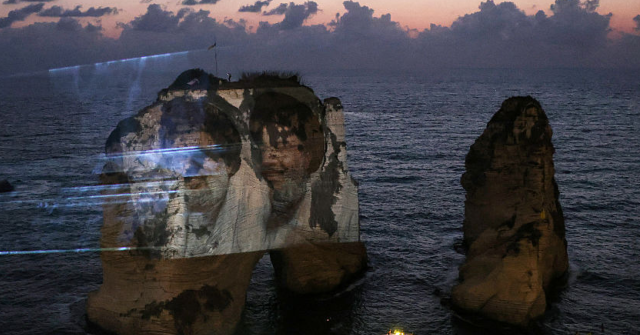Lebanon on Tuesday suspended the operating license of a Hezbollah-linked non-governmental organization (NGO) called the Rissalat Association because it projected images of slain Hezbollah leaders onto a beloved national landmark.
On September 25, Rissalat projected portraits of Hezbollah Secretary-General Hassan Nasarallah, the terrorist leader eliminated by an Israeli airstrike in September 2024, and his successor Hashem Safieddine, whose reign lasted only a few weeks before he was also killed by an Israeli strike, onto Beirut’s Pigeon Rock.

Nasrallah had a long list of terrorist atrocities to his name during his two decades in power. His final terrorist act was to order rocket barrages from Lebanon against civilian targets in Israel. He was unpopular in Lebanon at the time of his death, but Hezbollah has worked hard since then to create an aura of martyrdom around him.
Pigeon Rock is a a double rock formation near the Mediterranean coast of Lebanon, sometimes referred to in the plural as “Pigeon Rocks” or the “Rocks of Raouche.” Raouche is the Beirut neighborhood closest to the rocks.
Pigeon Rock is a landmark of great natural beauty and historic significance to Lebanon and a treasured tourist attraction. Hezbollah is both a terrorist organization and a powerful political party in Lebanon. Lebanese officials did not want the group to use Pigeon Rock for its political messaging, so Rissalat was denied permission to illuminate the rock when it held a commemorative rally for Nasrallah and Safieddine.
Rissalat packed a few thousand mourners into its event on September 25 and kept them in suspense well into the evening, when giant images of Nasrallah and Safieddine were projected onto Pigeon Rock. The crowd went wild, but the Lebanese government was not amused.
The Hezbollah-linked Rissalat tried to hedge its bets by including pictures of other Lebanese leaders in its slideshow, including Rafik Hariri, the former prime minister who Hezbollah assassinated with a massive bomb in 2005. Lebanese officials were unimpressed by this gesture at political diversity, and on Tuesday they suspended Rissalat’s license to operate as an NGO pending further investigation.
Interior Minister Ahmed al-Hajjar, who brought the motion to suspend before the Lebanese Cabinet, accused Rissalat of “violating laws governing public property, encroaching on it and using it for purposes other than those designated, and for activities that affect public order without prior authorization or approval.”
Information Minister Paul Morcos said the suspension was necessary for “maintaining public order on the one hand, and respecting the freedom to establish associations guaranteed by the Constitution on the other.” This was an allusion to Prime Minister Nawaf Salam’s stated desire to completely dissolve the Rissalat Association.
Salam said Rissalat’s actions, which included “breaching internal regulations, misusing public property, obstructing public roads, and abusing its right to organize gatherings,” were sufficient to justify dissolving the organization.” He said he was content with the suspension until administrative and judicial investigations were completed.
Hezbollah’s weapons dealers and financiers in Iran were unsurprisingly angered by the suspension of Rissalat. The Tehran Times on Tuesday taunted Salam for cowardice in the face of ongoing Israeli ground and air actions on Lebanese territory, insisting Israel was more of an obstacle to peace than Hezbollah.
“Obviously, the proposed suspension of Rissalat is the result of narrow political calculations. While the government leaves Israeli attacks unanswered and distances itself from confronting the economic crises and corruption, it chooses to restrict an artistic association simply because it is affiliated with Hezbollah!” the Iranian state newspaper exclaimed.
The Tehran Times denounced the Rissalat suspension as “more like a malicious political interpretation than a fair legal decision,” and claimed Salam was only prevented from dissolving Rissalat entirely by the intervention of President Joseph Aoun, who was supposedly terrified of “Hezbollah’s firm warnings against infringing on the rights of its associations.”
Read the full article here


